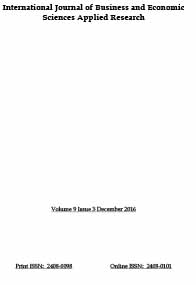Technology Spillover from Foreign Direct Investment in Turkey
Technology Spillover from Foreign Direct Investment in Turkey
Author(s): Özcan KarahanSubject(s): National Economy
Published by: Τεχνολογικό Εκπαιδευτικό Ίδρυμα Ανατολικής Μακεδονίας και Θράκης
Keywords: Technology Spillover; Foreign Direct Investment; Turkey;
Summary/Abstract: Purpose – The purpose of this paper is to examine the opportunities and challenges that youth entrepreneurs are facing in Montenegro, considering all aspects of youth participation in the development of the country. A quality research of several successful young entrepreneurs is presented. Design/methodology/approach – Several successful young entrepreneurs were interviewed. The principles of case study design and method were followed. Data collection involved both macro and micro level analysis of interviews and direct observation. Findings – The analysis shows that although in the areas of youth participation, significant progress has been made in the last several years, youth entrepreneurship programme in Montenegro is still in its early stages of development and needs strong sustainable commitment, assuring the development and efficient functioning of various youth participation mechanisms at the local, regional and national level. It is also essential to continue to standardize and support youth work, youth information and non-formal business education of young people. Surveys show that young people in Montenegro believe they have much to offer and can significantly contribute to all areas of the society’s development. However, their potential remains greatly untapped due to certain obstacles that they face. There are needs for encouraging programs to inform youth about the value of their participation in all aspects of society. Research limitations/implications – The main limitations were access to a greater number of successful young entrepreneurs making the analysis more descriptive and conclusive. Originality/value – The paper supports understanding of the complex employment challenges and opportunities facing youth and stimulates discussion on how to address this key development issue.Purpose – The aim of this paper is to investigate the relationship between Foreign Direct Investment flows and economic growth using quarterly data for the period of 2002 and 2015 in Turkey. Thus we try to examine whether technological diffusion generated by FDI inflows to Turkey enhances the innovative capability of the country or not. Design/methodology/approach – The variables Foreign Direct Investment (FDI) and Gross Domestic Product (GDP) are sourced from Electronic Data Delivery System (EDDS) in Central Bank of the Republic of Turkey. FDI series consist of values called "Net Incurrence of Liabilities" in Balance of Payments Analytical Presentation while GDP series gather from the expenditure based GDP data in EDDS. Both Johansen Cointegration Test and Granger Causality Test are applied to examine between Foreign Direct Investment flows and economic growth in Turkey. Findings – Results reveal that there is not any significant link among the FDI and economic growth during the studied time period in Turkey. It seems that FDI inflows to Turkey is not complementary to economic growth, which shows that positive spillover effect sourced from FDI inflows to Turkey does not exist. Research limitations/implications – Policymakers should recognize that technology spillover effects of FDI do not occur without greater absorptive capacity. Attracting FDI is only one part of the story and thus not yield the desired benefits itself. Positive effects of FDI depends on the overall incentive and capacity structure of the host country. Then the key policy implication here is that policymakers should give same weight of policies aimed at attracting FDI versus those that seek to improve local economic conditions.
Journal: International Journal of Business and Economic Sciences Applied Research (IJBESAR)
- Issue Year: 9/2016
- Issue No: 3
- Page Range: 7-12
- Page Count: 6
- Language: English

